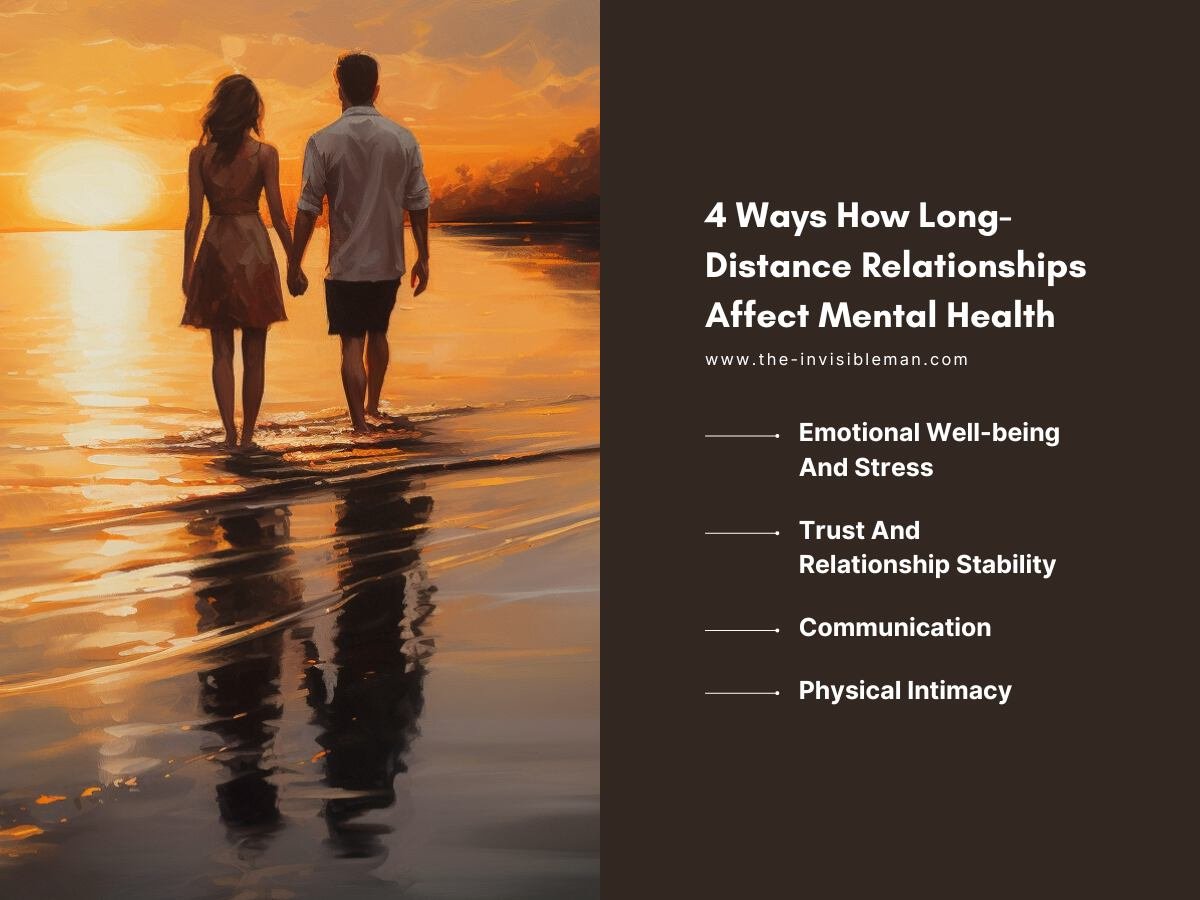Psychological Effects Of Long Distance Relationships You Feel
Table of Contents Show
In relationships, few topics are as widely discussed and as deeply misunderstood as long-distance relationships. Often shrouded in myths and misconceptions, these relationships are frequently dismissed as unsustainable or destined for failure.
However, The Invisible Man’s viewpoint reveals a different narrative, one that uncovers the hidden truths of long-distance relationships and explores their psychological effects. They will certainly dispel the harsh facts about long distance relationships that you believe.
A. Do Long-Distance Relationships Affect Mental Health?
Long-distance relationships can have a significant impact on an individual's mental health, both positively and negatively. The effects are multifaceted, encompassing aspects such as emotional well-being & stress levels, trust, communication, and physical intimacy.
1. Emotional Well-being and Stress
Being in a long-distance relationship can lead to increased stress levels. A study by Du Bois et al. (2016) found that individuals in long-distance relationships experienced more individual and relationship stress than those in proximal relationships. This stress can be attributed to the physical, mental, and emotional distance from the partner, which may lead to a deficiency in the production of "happy hormones" like dopamine and serotonin. Dopamine is associated with pleasure and rewards, while serotonin plays a key role in mood regulation, sleep, and sexual desire. A deficiency in these hormones can lead to symptoms such as inattentiveness, lack of motivation, difficulty sleeping, anxiety, and mood fluctuations.
2. Trust and Relationship Stability
Trust is a crucial element in any relationship, and it can be particularly challenging in long-distance relationships. A study by Krapf (2017) found that the physical distance between partners influences the development and stability of romantic relationships. The study found that couples in long-distance relationships were more likely to separate than those living a short distance away, possibly due to a lack of trust.
3. Communication
Effective communication is vital in long-distance relationships. Regularly planning times to catch up and share experiences can help both partners feel secure. A recent study by Holtzman et al. (2021) found that texting helps long-distance relationships by keeping both people in touch. However, it's important not to rely solely on texts, as they don't replace hearing the other person’s voice and tone via phone or reading their body language through video conferencing.
4. Physical Intimacy
Physical intimacy, often considered the cornerstone of romantic relationships, presents a unique challenge in long-distance relationships. The absence of regular physical contact - the tender touch, the warm embrace, the shared laughter - can be a daunting reality. However, this absence does not signify a void. Instead, it offers an opportunity to redefine intimacy and connection.
In long-distance relationships, physical intimacy takes on a different form. It transcends the physical and ventures into the emotional and intellectual. It is found in the shared silence over a video call, the synchrony of watching a movie together while miles apart, or the anticipation of the next reunion.
Moreover, the lack of physical intimacy in long-distance relationships can also lead to a heightened sense of emotional intimacy. The conversations often dive deeper, the connections become stronger, and the relationship evolves beyond the physical.
B. What does a long-distance relationship do to your brain?
Long-distance relationships (LDRs) are a unique emotional and psychological experience. They can be challenging, rewarding, and transformative, all at once. The effects of LDRs on the brain are profound and multifaceted.
Here are five significant ways LDRs can impact your brain:
1. Increased Stress Hormones
LDRs can lead to an increase in stress hormones like adrenaline and cortisol. This increase is associated with feelings of depression, anxiety, and aggression. A study conducted at Adler University in Chicago found that individuals in LDRs reported higher stress levels both inside and outside the relationship, compared to those in geographically close relationships[^1^].
2. Longing and Ache
The absence of a partner can lead to intense longing and an inner ache. This is a result of decreased levels of neurochemicals like phenylethylamine (the love molecule), oxytocin (the cuddle hormone), and dopamine (the reward hormone). These chemicals are usually stimulated by physical closeness and intimacy, which are often lacking in LDRs.
3. The Oxytocin Dilemma
Oxytocin, often referred to as the "bonding hormone," plays a significant role in creating a sense of stability and intimacy in relationships. However, in LDRs, the opportunities for oxytocin release through physical touch are limited, which can pose challenges to experiencing the full benefits of this hormone.
4. The Reunion Rush
The occasional reunions in LDRs often lead to a rush of feel-good hormones. When you finally get to be with your partner after a long separation, your brain is flooded with phenylethylamine, oxytocin, and dopamine. This leads to a strong desire to connect, have sex, and feel bonded to your partner.
5. Resilience and Adaptation
Despite the challenges, LDRs can also foster resilience and adaptation. Your brain learns to respond to the unique circumstances of an LDR, developing new coping mechanisms and emotional responses. Over time, this can lead to increased emotional strength and flexibility.
It's important to remember that every relationship, whether long-distance or geographically close, has its own set of challenges and rewards.
C. The Seven Psychological Effects & Facts of LDRs
1. The Incertitude Dance
The distance between two individuals in a long-distance relationship can breed uncertainty, leading to negative thoughts and a pessimistic outlook on the future of the relationship. However, a study in the Journal of Social and Personal Relationships found that couples in long-distance relationships often have stronger bonds due to the constant anticipation and planning for reunions. The uncertainty, in this case, can serve as a catalyst for stronger emotional connections.
2. The Absence of Physical Contact
The lack of physical intimacy is often seen as a major drawback of long-distance relationships. However, a study published in the Journal of Communication found that couples in long-distance relationships often communicate more effectively and deeply, compensating for the lack of physical contact with emotional intimacy.
3. The Emotional Toll
Long-distance relationships can take an emotional toll on individuals, leading to feelings of loneliness and depression. However, a study in the Journal of Sex & Marital Therapy found that individuals in long-distance relationships often develop stronger coping mechanisms and resilience, turning the emotional toll into a source of personal growth.
4. The Jealousy Factor
Jealousy can be more common in long-distance relationships due to the lack of constant contact. However, a study in the Journal of Applied Social Psychology found that jealousy often leads to increased communication and efforts to improve the relationship, turning a potential negative into a positive.
5. The Commitment Challenge
Long-distance relationships can sometimes lead to a lack of commitment due to the physical separation. However, a study in the Journal of Marriage and Family found that couples in long-distance relationships often have higher levels of commitment due to the increased effort required to maintain the relationship.
6. The Time Management Test
Balancing busy schedules and maintaining regular contact can be challenging in long-distance relationships. However, a study in the Journal of Social and Personal Relationships found that this challenge often leads to improved time management skills and a greater appreciation for the time spent together.
7. The Reunion Rush
The rush of feel-good hormones during reunions in long-distance relationships can create intense emotional experiences. A study in the Journal of Social and Personal Relationships found that these reunions often lead to increased relationship satisfaction and a stronger bond between partners.
D. The Science & Studies On Long-Distance Relationship
Long-distance relationships (LDRs) often face skepticism and doubt, with many assuming they are less satisfying than geographically close relationships (GCRs). However, research suggests that this common perception may not be entirely accurate.
In a study published in Sage Journals, researchers explored the satisfaction levels of individuals in long-distance relationships. They found that despite the physical separation and potential stressors, many LDRs fare well in terms of standard relationship metrics. Surprisingly, members of LDRs reported comparable or even greater satisfaction, trust, stability, and intimacy compared to members of GCRs.
This finding challenges the conventional wisdom that physical proximity is a prerequisite for a fulfilling and happy relationship. It suggests that individuals in LDRs may use alternate means of maintaining relationship satisfaction, such as mentally activating feelings of closeness to their partners. This process, known as "relational savoring," can yield greater positive emotion among participants, particularly those with medium to high baseline relationship satisfaction.
Here are 5 more interesting results from long distance relationship research:
1. The Paradox of Distance
A study published in the Journal of Communication found that long-distance couples often have stronger bonds and more substantial communication than their geographically close counterparts. The researchers attributed this to the fact that long-distance couples tend to idealize their partners' behaviors, leading to a greater sense of intimacy.
2. Quality Over Quantity
A study in the Journal of Sex and Marital Therapy reported that long-distance relationships are not necessarily disadvantaged in terms of relationship satisfaction compared to geographically close relationships. The study found that the quality of interactions in a relationship, rather than the quantity, determined relationship satisfaction.
3. The Stability Factor
A research article in the Journal of Social and Personal Relationships found that long-distance relationships are no more likely to break up than geographically close relationships. The study suggested that the level of commitment, rather than the physical distance, was a more significant factor in relationship stability.
4. The Communication Advantage
A study in the Journal of Marriage and Family found that long-distance couples, contrary to popular belief, might actually be better at communication than geographically close couples. The researchers suggested that the lack of face-to-face interaction in long-distance relationships might lead to more meaningful communication strategies.
5. The Commitment Conundrum
A study published in Family Process found that individuals in long-distance relationships generally reported higher levels of dedication to their relationships and lower levels of feeling trapped. However, they were as likely as individuals in close-proximity relationships to have broken up by the follow-up assessment.
E. Conclusion
In human relationships, long-distance relationships represent a unique weave. In particular, the psychological experiences of long-distance relationships are a complex interplay of emotions, and neurochemistry. They are marked by intense longing, profound connection, and a unique set of challenges. However, these experiences are not just about enduring the distance; they are about embracing the journey, savoring the highs, and navigating the lows.
Finally, the narrative of long-distance relationships is often painted with a broad brush of negativity and this narrative needs to be reframed. Long-distance relationships are not just about the distance between two people; they are about the connection, the intimacy, and the shared experiences that transcend physical boundaries.




















